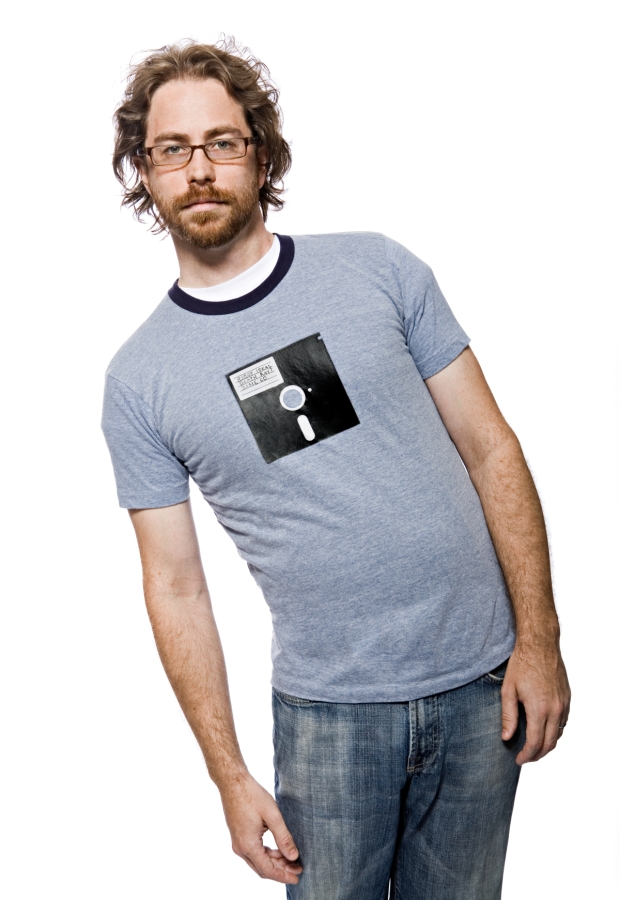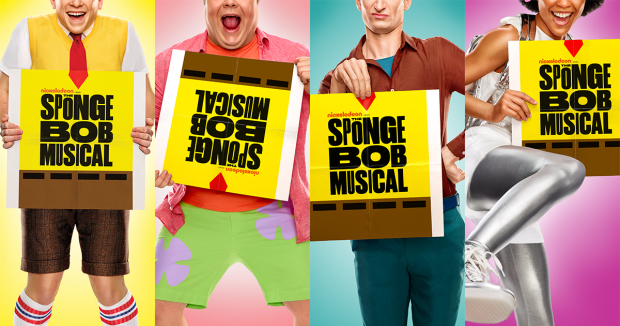Musical-Theater Noob Jonathan Coulton Is Getting His Feet Wet With The SpongeBob Musical
The “Code Monkey” turned nerd-rock star is on his way to Broadway.
Jonathan Coulton, writer of the Broadway-bound The SpongeBob Musical's opening number and the show's "additional lyrics," has followed an unusual path to musical-theater songwriter. "I wouldn't describe myself as a serious theater fan," he said. Which is not to say that he can't sing the full score of Jesus Christ Superstar, because he can. But it's hardly surprising the cult-favorite singer-songwriter has had little chance to further cultivate his love of the show tune: He's been too busy conjuring a hyper-unique music career out of thin air.
Coulton spent his early 20s as a programmer before abandoning that profession for another computer-based occupation: musician. Described by NPR as an "Internet rock star," Coulton doesn't have a record label, releasing his nerd-friendly music primarily on his website. But despite unconventional methods, Coulton has experienced huge (if unusually manifested) success since publishing his first album in 2003. He has over 116,000 Twitter followers, for instance, and his own annual cruise (JoCo Cruise 2017 is booking now).
Before Coulton makes his next bold career leap — into the waters of the Pacific Ocean — he talked to TheaterMania about what makes his music a natural fit for Broadway and why it's taken him so long to put the characters in his songs onstage.
"I feel like the one thing that's stopped me from writing my own musical is that I don't have an idea for a musical. It's a big hurtle to get over," Coulton laughed, before adding slyly, "Well, I have one idea for a musical about Alexander Hamilton. He's a lesser known founding father, I think it's gonna work out really well."

(photo provided by the publicity office)
How did you get attached to The SpongeBob Musical?
Out of the blue I received an email from one of the producers at Nickelodeon saying that they were doing this SpongeBob Broadway musical and that the director, Tina Landau, was a fan of mine and wanted to talk to me about doing a song. And then she said, "I think you would be very good at writing the opening number," which was kind of a terrifying prospect. Because that opening number has got to do a lot of heavy lifting — it's SpongeBob beginning his day and walking around Bikini Bottom and meeting all the characters. I was pretty terrified, but as it happens, as I was walking home from that meeting, I started having ideas.
How does your writing style work for musical theater?
I think that my approach to songwriting really does sort of lend itself to musical theater because I have always written about characters. And I'm a very story-driven writer. It's important to me to know, when I'm writing a song, "Who is it who is speaking?" "What do they want?" "What do they not know about themselves?" "What do we know about them?" To me, that's a much more interesting way of writing a song than just, I love a girl and she doesn't love me. Although if you can fit that in there as well, fantastic. So I think that in many ways I've been writing musical theater songs most of my career, it's just they haven't been attached to musicals.
What do you appreciate about SpongeBob as a character?
I think one of the ways in which I identify with SpongeBob is his positivity. There's one way of looking at SpongeBob, which is to say his positivity is a tool that he uses to deal with a cruel and difficult world. Because things don't always go SpongeBob's way, but he smiles through it. He pushes his way through it with this positivity that ultimately drives people around him nuts. And I think it's a good lesson that you can kind of create the world around you that you want to create through the sheer force of your will and that you don't have to take setbacks lying down.
What does it mean that you're writing "additional lyrics"?
Tina's vision is that each song would be done by a different artist. And the challenge of that is that every artist is focusing on their piece of it, but you know, they might not be thinking of the whole arc. And of course the arc itself is changing over the course of the development of the show so you need to occasionally change a line here and there. Or you might find that two artists independently came up with the same fish pun — and you don't want to use the same fish pun more than once. Because there are so many artists involved, some of whom are very famous and very busy, rather than having to go back to each one of them, I think they wanted to have somebody who could think in a larger way about the show and be available to make whatever [small lyric] changes are needed [in each song].

(show art provided by Boneau/Bryan-Brown)
It's interesting that this is another job that never really existed before you sort of fell into it.
Yeah, I have a habit of that sort of thing. It's kind of fun because I definitely feel like over the years of being a songwriter I'm proud of my ability to craft a lyric. One of the most important things for me is getting the lyric that works and that fits and that rhymes in the right way but also can move you in the right way. So I'm delighted to find myself in a position where I get to use that craft.
What was your first thought when you were pitched this idea?
When I first met with Tina and she talked about her vision for the show, the one thing that really put me over the edge was this thing that she said: "These are not people wearing foam heads. This is not SpongeBob on Ice, this is not Ice Capades." So that really set my mind at ease, because of course when you hear "SpongeBob musical", the first thing you think is of those people in Times Square wearing SpongeBob costumes, and this is not that. And she felt that so passionately at the start and had such a clear vision that I was delighted to start working on it. And in watching it come together, it's really amazing that she's pulled it off.
I remember one of the workshops, they asked some of the people in the audience what they thought and they asked this kid, "What did you think of how SpongeBob looked ?" And the kid said, "Yeah, it was good. I think this is how SpongeBob looks in real life." Which is hilarious and, I think, absolutely correct.









